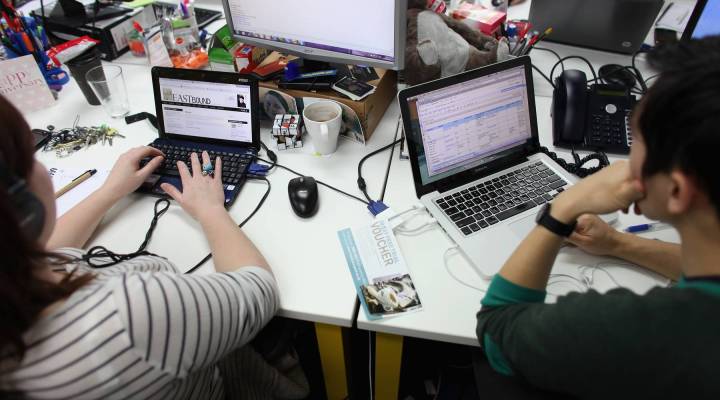
Women who left tech jobs were sexually harassed and passed over for promotions, report says
Women who left tech jobs were sexually harassed and passed over for promotions, report says

That story was produced by Youth Radio.
Camila Minor considered enrolling in college after immigrating to San Francisco from Brazil, but instead opted for Hackbright Academy, an all-female computer coding course.
Inside the Hackbright classroom, 22 women were learning the computer language Python. The walls were covered in cheerful Post-it notes with handwritten notes that say things like, “You’re amazing.” Some of women were even high-fiving each other as they solved problems.
The 12-week coding boot camp costs $16,500. It’s an investment 26-year-old Minor hopes will pay off with an entry-level tech job.
Women make up only about a quarter of the tech workforce, but Minor thinks Silicon Valley’s gender problem might also be an opportunity.
“There is a big need for women,” Minor said. “We focus mostly on being good enough so there’s going to be no reason for anybody to bring up, ‘Well, you’re not a man and you’re not good enough.’”

Camila Minor, 26, is hoping that being a woman might give her an advantage in the job market.
But Allison Scott, lead researcher on the 2017 Tech Leavers Survey from the Kapor Center for Social Impact, said that being good at what you do isn’t enough.
“We found that women experience significantly more unfairness than men,” Scott said.
Along with fellow researchers, Scott surveyed more than 2,000 people who left tech jobs to find out what prompted them to leave the industry. Women in the study reported higher rates than men of being stereotyped, sexually harassed and being passed over for promotions. Women of color had it the worst.
According to the study, unfairness in tech companies leads to high turnover and even higher employee replacement costs.
“Unfairness alone costs companies a staggering $16 billion per year,” Scott said.
But the study found companies can save on turnover costs when they invest in things like hiring an inclusion director and setting diversity goals.
Twenty-five-year-old Danielle Olson earned her bachelor’s in computer science and engineering at the Massachusetts Institute of Technology, where she is working on her Ph.D. She is basically a coding superstar, but said that she did not always feel like one.
| Sheryl Sandberg: “We all deserve equal pay” |
| How to fix tech’s sexual harassment problem |
| How women raised the median family income |
“I really believed that I had to be Bill Nye the Science Guy to be successful in engineering or science,” Olson said. “You know, have his personality type, his interests, even the way he dressed and looked and talked.”
Olson, an African-American, says when she got into MIT, some of her high school classmates told her she only got accepted because she was black. She said it took years to feel as if she belonged. Now though, she plans to become a college professor and mentor others in computer science.
“The more I learn about engineering and science, the more I realize how important it is that I’m here,” Olson said.
A study released last month by FundersClub, an online startup investing platform, found that tech startups with at least one female founder are far more successful at achieving gender parity across their workforce. Female employees average just 24 percent at startups with male-only founders, but nearly 50 percent at startups with at least one female founder.
In August, Youth Radio colleague Christy Duong will be heading to University of California, Merced, to study computer science and engineering. The 17-year-old believes gender discrimination shouldn’t deter young women hoping to write their careers in code.
“If you like it, then you should do it, regardless of gender,” Duong said, adding that if she encounters sexism in the workplace, “I’ll tell them to stop, because it’s not comfortable and it’s not appropriate.”
“Do you think that you’ll be able to just say stop and people will stop?” this reporter asked. “If they don’t, what do you think you’ll do?”
Duong thought for a moment before saying, “Then, I’m just going to suck it up and deal with it. Because I would like a job.”
She said that by pushing the status quo, hopefully the next generation of women engineers won’t have to deal with the same struggles.
There’s a lot happening in the world. Through it all, Marketplace is here for you.
You rely on Marketplace to break down the world’s events and tell you how it affects you in a fact-based, approachable way. We rely on your financial support to keep making that possible.
Your donation today powers the independent journalism that you rely on. For just $5/month, you can help sustain Marketplace so we can keep reporting on the things that matter to you.


















